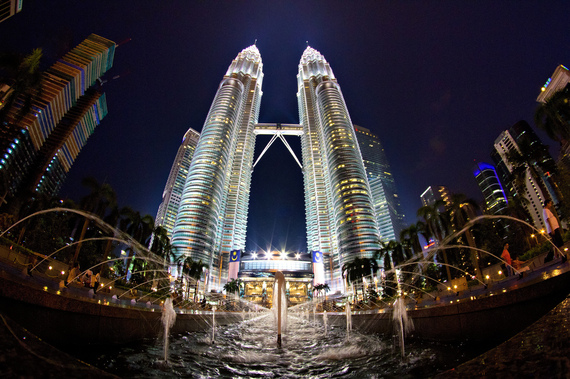 Kuala Lumpur as seen on Flickr via gulfu
Kuala Lumpur as seen on Flickr via gulfu
Under the watchful eye of Malaysia's Prime Minister, Najib Razak, an agreement was finally signed on November 22nd in Kuala Lumpur by the leading nations of Southeast Asia, heralding the emergence of a new Asian power bloc. The agreement in question, which has been under discussion for the greater part of the 21st century, finally establishes the formation of the ASEAN Economic Community (AEC) - an entity which, for the sake of convenience, might be described as Southeast Asia's answer to the 1950s European Union. With much fanfare, the agreement will come into effect on December 31 when the region officially becomes a single market. Like the EU, the AEC seeks to allow for free movement of goods, services and skilled labor in what is first and foremost a political project for greater regional integration. ASEAN wants to be seen as a competitive alternative to China and India, increase its global clout as a common bloc vis-à-vis Beijing's aggressive policy in the South China Sea, and boost its regional identity. However, unlike the EU, the AEC reflects a level of diversity that simply cannot be found anywhere else. It contains Buddhist nations, Muslim nations, Communist regimes, democracies, authoritarian governments, monarchies and even (in the case of Thailand, Southeast Asia's current black sheep in the fold) a military junta. To some, this diversity is seen as a weakness, a recipe for inconsolable chaos. To others it hints at the potential for mutual restraint in the quest for an enviably effective middle ground. Regardless of the playground nattering of political scientists, however, one thing is for certain: the AEC is no joke. The economic community has a larger population than either the US or the EU - more than half a billion people. If implemented correctly, it would also be a larger trading bloc than the West and would serve as a potential political counterbalance to China. Of course, those are some really big Ifs that require a complete revamp of the region's political mores. Corruption has consistently been an issue in many of the SEA nations, notably in the likes of the Philippines, Cambodia and Laos, and this could present a serious issue when it to comes to effectively implementing a liberal model of open trade. This paradigm is not compatible with the prying fingers of the government - especially with those governments that like to get their hands dirty in the hope of reaping undue profits. Labor conditions will also become a point of contention. However, the formation of the AEC has not suddenly cast an unknown economic player into the limelight. This is not a region that in any sense has shied away from economic development, even at a national level. Singapore, for instance, is known worldwide for its competitive business environment and for its top-notch education system - two universities are featured in the world top 20, beating even Yale and King's College London. Indonesia, Southeast Asia's economic giant, has gone from strength to strength - a quiet victor in the battle to compete with others such as China and Japan. Vietnam is touted to be Asia's next 'Little dragon' alongside the likes of South Korea and Taiwan, as its garment manufacturing industry continues to dominate the world stage, paralleled by an ever mounting challenge to the world's rice export leaders. Even Thailand, a country whose fortunes are on a lemming-like high dive from a cliff's edge, is still boasting the region's second highest GDP. Make no mistake, the AEC is not a two-horse enterprise, as Malaysia is quickly emerging as Washington's partner of choice in the region. Having identified that dealing with the US opens up a whole series of markets for the region, Malaysia's Najib has engineered a shift away from Beijing. Unlike other emerging markets that have not managed to decouple their economic fates from China's and have slumped, Kuala Lumpur is steaming ahead. The country has been singled out by the IMF 's Christine Lagarde for 'its strong fundamentals' that have allowed it to weather China's slowdown with little consequence. Indeed, against all previous estimates, Malaysia's export market gained pace during October, climbing nearly 17% year on year, boosted by a weak ringgit and by exports bound for the EU and the US. However, perhaps the most encouraging sound coming from Kuala Lumpur is its commitment towards achieving a low carbon economy. With the COP21 summit currently taking place, and every relatively wealthy nation in the world willing to do as little as it has to in order to preserve its own interests, Malaysia's pledge to reduce emissions by 45% by 2030 stands out. With plans already in place for the creation of Green Special Economic Zones, carbon free cities and smart electricity grids, not to mention a hugely subsidized solar industry, Malaysia sets ASEAN's bar on climate change issues. While the AEC is far from being perfect (only 79.5% of measures called for were successfully implemented at the time of this writing), this economic bloc should not be ignored in Washington. As Iwan J. Aziz, professor of economy at the University of Indonesia and Cornell University in the U.S, quipped, the AEC is "a journey, not a destination". Let's hope the AEC won't walk down that road alone.
